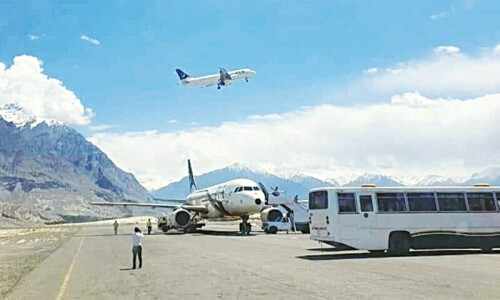OVER the last 14 years, the Kasi Casualty Ward of the Sandeman Provincial Hospital has been hit by at least two suicide attacks — including the one on August 8 in which 75 people died. During that period, it has also seen the near and dear ones of the patients resort to violence in protest against the lack of facilities there.
The man who donated generously to the ward would never have thought that one day his own grandson would die for want of first aid at its doorstep. Daud Kasi, a former president of the bar association and grandson of the donor, died there due to loss of excessive blood and lack of first aid. Three other lawyers from the Kasi families, including Barrister Adnan, also lost their lives in the attack.
“My father donated to the casualty ward to save the lives of common people, but he did not know that one day his own family will lose his grandson because of criminal negligence of the doctors, health department and government,” said Naseebullah Kasi.
The Kasi Casualty Ward was built over a period of two years in the mid-90s at a cost of Rs200 million, which was donated entirely by the late Abdullah Jan Kasi, the head of the wealthy Quetta family. He died of cancer in 1989 at the same hospital after being treated there for a month.
In his will, Mr Kasi instructed his four sons — including Aimal Kasi, who was executed in the US in 2002 for killing two CIA men — to build the emergency ward for the benefit of the public. Later, the ward was expanded at a cost of Rs10m, which was donated by a local pharmaceutical company, Merck Marker.
Each time there was a bombing in the city or an attack was carried out on members of its Shia Hazara community, and the victims were brought to the hospital for treatment, the doctors and paramedics invariably came under physical attack from the patients’ relatives over the lack of facilities there.
The Sandeman Provincial Hospital is one of the city’s two major hospitals and has 780 beds. It has 488 doctors and 183 nurses and paramedics. The number of its supporting staff stands at about 1,000.
On the day of the recent attack, for which the militant Islamic State claimed responsibility, a suicide bomber blew himself up in front of the casualty ward when lawyers had gathered there to receive the body of Bilal Anwar Kasi, the president of the Balochistan Bar Association who had been killed in a gun attack. In the aftermath of the suicide attack, friends and relatives of the injured people were calling out for medical aid and assistance, but no doctor or nurse was available for treating them.
“It is a shameful fact that the injured were lying at the doorstep of the emergency ward, but they could not be provided treatment. People living in America and in European countries called me and expressed their dismay over this failure,” said retired Brig Abdur Razzak Baloch, a social worker and chairman of board of directors of the Children Hospital, Quetta.
He said the 30 minutes immediately following an attack were very important for the injured because they were required to be taken to a medical facility during that period. But in this attack there was ample time because the attack took place right in front of the casualty ward. He said that with the blow of a whistle all the doctors and nurses present in the vicinity could have been called to the aid of the injured but this didn’t happen.
What’s more, the dozens of medical stores near the hospital were closed down immediately after the attack, either by their owners themselves or due to instructions from the authorities.
“In the morning shift, we have three men and two women doctors, but one of them has proceeded for Haj and there has been no replacement. But it is wrong to suggest that we could not provide treatment to the injured,” said the medical superintendant of the hospital, Dr Abdur Rehman.
Meanwhile, it’s ironic that a trauma centre — located right behind the emergency ward and completed back in 2014 — has yet to be made operational due to a dispute between doctors.
Published in Dawn, August 18th, 2016
















































Dear visitor, the comments section is undergoing an overhaul and will return soon.